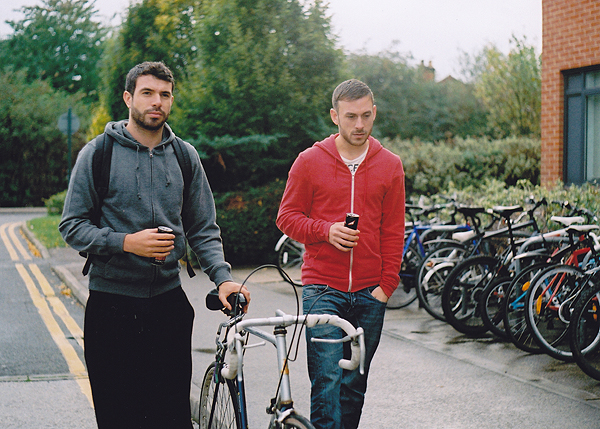by Tristan Goligher
In the UK micro budget films are often sneered at, often derided, and often rightly so. It is a fair criticism that many of these films can be high in over indulgence, and low in technical execution. But increasingly, over recent years, micro budget film makers are proving to be amongst the most exciting and innovative of emerging talent. In the states this grass roots creative movement has been evident for some time, giving birth to film makers like Kelly Reichardt, Andrew Bujalski, and Joe Swanberg, to mention just a few. Now it seems that we, the British, are catching on too. Change is in the air, and momentum is gathering.

One big difference, and potential advantage, we have in the UK over the US is public funding for film. For a number of years now we’ve had several ‘microbudget schemes’ running in the UK. These involve open calls for applications, with large numbers of film makers applying, before being whittled down into shortlists which go through development, with a final fortunate few being commissioned. The highest profile of these programmes is Film London’s Microwave, and iFeatures on which I am now an Executive Producer. Born from these schemes we have been some very notable, stand out films, such as Time and the City, and Shifty but often the resulting films usually find themselves looking in from the perihpery of the British cinema landscape. Unlike in the states we don’t have the abundance of festivals celebrating such films, and giving them a genuine platform for exhibition.
This status on the periphery, however, is beginning to change. But slowly so. It’s become increasingly difficult for first time, indie (usually drama), directors to get their work funded. Without named cast in front of the camera, or already famous film makers behind it, it’s all but impossible. At last years BIFAs (British Independent Film Awards) the Debut director category consisted of Joe Cornish (Attack The Block), who in the UK is a famous comedian, radio DJ, and co-writer of Tin Tin. Ralph Fiennes (Coriolanus), no biography required. Richard Ayoade (Submarine), a famous TV actor whose film Submarine included Paddy Considine, Sally Hawkins, and as an Exec Producer Ben Stiller. Paddy Considine (Tyranassaur), again no biography required. Lastly John Michael McDonagh (The Guard), who is a real new comer. This is not a criticism, but it does paint a good picture of the current state of affairs for emerging directors. In this context emerging film makers face one of three three choices. Firstly get a different job, secondly attach names, which is not always possible or appropriate, or lastly make your debut, or even sophomore, feature for less money. For this simple reason micro budget film making is now crucial for emerging talent here in the UK.
When Andrew Haigh and I came to finance Weekend, we already had an established relationship with some of the funding bodies in the UK having already made a successful short film called Five Miles Out. Andrew had also one very good (admittedly niche) feature film, Greek Pete, under his belt, but still the project was seen as too great a risk, even for the micro budget we were looking to raise. Without delving, too deeply, into the travails of financing this film we ultimately raised about 70% of what we set out for, and were faced with a decision. Do we give this film up? Or do we take the plunge and make it for what we have? We went ahead, made the film for less than $200,000 and premiered it at SXSW in March of last year. Since then it’s gone on to win a number of awards, achieve critical acclaim, sell internationally, and so far generate over a $1,000,000 worth of transactions. There is no question, what so ever, that it has exceeded anything we could ever have, realistically, expected from it. Most importantly, it’s hopefully given us a platform that will help us get the next film made. For that reason I now acutely appreciate the value, and necessity, of micro budget film making.

We did have public funding support from EM Media, and Creative Scotland, but despite that Weekend was still largely made outside of the ‘system’, and we were lucky enough to have three excellent Executive Producers, who trusted us, and worked with us. But over the next few years I suspect that the majority of profiled microbudget work in the UK will come through more, centrally managed, structured schemes.
This is great news, and should mean more opportunities for film makers trying to make their breakthrough films, and establish their careers. Now working on one of these initiatives I do often ask myself what the potential problems and pitfalls of this approach may be. My politics fall firmly left of centre, so I don’t suggest we should not have public support for the arts. But by simply looking at the micro budget work being commissioned (and not being commissioned) in the UK it’s apparent that in the past something has been missed. The public funding structure, and the culture that has grown around it, seems to lack the vibrancy and originality of the more entrepreneurial American scene. To be clear I don’t doubt the benefit of public funding to support emerging film makers through short films and microbudget features. However, I do question, the culture that has grown alongside it. A culture that seems to be to our creative detriment. The decision of the ‘powers that be’ to fund our work or not, is often the stamp of approval we need, or the kiss of death we dread. Many aspiring film makers don’t make it past their early rejections, and others find themselves, after a few shorts supported, no longer in favour. Rejection is as true in America as it is in the UK, but I think it’s compounded by two things here. Firstly there’s a relatively small number of key financiers we can go to, and without their stamp of approval it’s hard to pursue further finance, such distributors, sales agent, and co-productions. Secondly those key financiers are not private investors, but rather they come as plenipotentiaries of the state. To varying degrees their opinion is endorsed. At it’s worst this leads to a culture of ‘cap in hand’ film makers seeking not only money, but by proxy, approval for the work they make. For those of us that survive the rejection to fight another day, the next step can often be to dilute, and homogenize our work. We hope this will help us better fit the mould of what we perceive as ‘fundable’. UK Film Council shorts are a case in point. There are many proficiently crafted, well developed, well acted short films that have come through the various short film schemes, You can sense a mile off, however, that they’ve been through the system. The uniqueness, and the joie de vivre is too often ground out. I know because I have, at times, been part of that system. This predicament is particularly damaging to young or inexperienced filmmakers, eager to please.
After the early rejections in financing Weekend Andrew and I suffered from just that. We put the script on the shelf, and began looking for new material. Fortunately, and quickly, we realised that Weekend was the film we wanted to make, and inspired by the endeavour, and persistence, of the American mumblecore ‘movement’ we put our heads down, were fortunate enough to find some champions, and got it made.
Other, notable, new filmmakers in the UK have done the same, Eran Creevy on Shifty, Nick Whitfield on Skeletons, Ben Wheatley on Down Terrace, and Joanna Hogg, on Unrelated and Archipelago. All but one of those being made outside of the ‘schemes’ I mentioned. Which raises a second challenge for more traditional financiers. With so many exciting talent being born from the microbudget scene how can they engage, and help foster these creative spirits. A challenge I often consider in my new role is the importance for us to support ideas through development, without simultaneously homogonising. Can the freedom of spirit, and individuality of the film makers I mentioned above surface through a more structured creative process, with more voices, and more at stake? I believe that it can. At Edinburgh international Film Festival this year there was an abundance of micro budget films on display, with both iFeatures and Microwave premiering strong films to excellent reviews, Flying Bling and Borrowed Time respectively. The talent is out there. Hopefully through initiatives like iFeatures the traditonal financiers are finding a way to engage with this new landscape. Hopefully in my role there I can embrace microbudget filmmaking for what it is; collaborative, innovative, and entrepreneurial. A diverse industry, telling diverse stories is something to strive for, and if risks can’t be taken at this level, when can they?
We can all look at the world through the prism of the past, and lament the lack of opportunities for first and second time directors, to make ‘real films’ on ‘real budgets’ or we can embrace the world we’re now in and appreciate the creative license that lower budgets give us as filmmakers, and the lesser risks it entails for financiers.
We can be realistic. We can make films. We can learn our crafts. We can see these as the first steps, of the long careers, that we hope they are.






